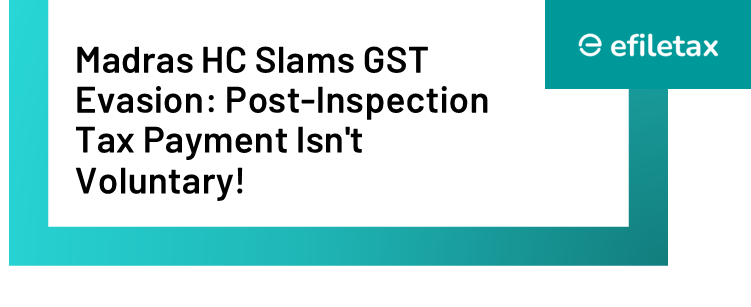
Introduction
The Madras High Court recently ruled that taxpayers who register under GST and pay tax only after an inspection cannot claim their compliance as voluntary. The case involved a charitable trust running a marriage hall without GST registration, eventually paying taxes post-inspection. The court held that such actions indicate deliberate tax evasion, making the taxpayer liable for penalties under Section 74 of the CGST Act.
This decision highlights the significance of timely GST registration and compliance, reinforcing that tax obligations cannot be evaded under the guise of voluntary payment.
Case Overview: GST Evasion Through Non-Registration
A charitable trust in Karur operated a marriage hall without obtaining GST registration, despite earning substantial rental income. The GST department’s Preventive Unit, upon inspection, discovered that the trust had collected ₹3.86 crore in receipts between July 2017 and January 2020 without filing GST returns.
Following the inspection, the trust voluntarily paid ₹58.93 lakh as GST and ₹8.84 lakh as penalty under the cum-tax method (Rule 35 of CGST Rules). However, the GST authorities issued a show-cause notice demanding an additional ₹10.60 lakh as tax, rejecting the cum-tax benefit claim, and imposing a total penalty equal to the full GST liability (₹69.54 lakh).
The taxpayer contested this, arguing that they did not suppress payments or misrepresent facts and should not be penalized under Section 74(1) of the CGST Act. However, both the Assistant Commissioner and Joint Commissioner upheld the tax demand and penalties.
High Court’s Observations: Non-Compliance & Penalty Justification
The Madras High Court ruled that:
- The taxpayer’s failure to register and pay GST from the outset indicated deliberate non-compliance.
- Registration and payment post-inspection could not be deemed voluntary, as it was prompted by enforcement action.
- Suppression of taxable transactions and avoidance of registration qualify as fraudulent activities under Section 74 of the CGST Act.
- The penalty imposed was justified, as the taxpayer only acted after being caught.
The court clarified that a voluntary payment under tax laws implies compliance before any enforcement intervention. If taxpayers register and pay tax only after an inspection, it indicates an intent to evade liability.
Implications for Businesses & Trusts
This ruling sets a crucial precedent for businesses, NGOs, and charitable trusts:
| Key Takeaway | Explanation |
|---|---|
| Timely GST Registration | Entities must register under GST if their turnover exceeds the prescribed threshold. |
| Avoiding Post-Inspection Compliance | Payment after enforcement action does not absolve taxpayers of liability. |
| Charitable Trusts Must Review GST Applicability | Not all activities of NGOs and trusts are GST-exempt—rental income from properties like marriage halls is taxable. |
| Section 74 Penalty Applicability | Fraudulent suppression of tax liability attracts a penalty equal to the evaded tax. |
Conclusion
The judgment reinforces the importance of proactive GST compliance. Whether businesses or charitable organizations, taxpayers must register under GST and pay their dues without waiting for enforcement actions. Ignorance or delayed compliance does not shield them from penalties under Section 74 of the CGST Act.
This case serves as a wake-up call—non-registration and tax evasion can have severe legal consequences, and voluntary compliance must genuinely mean fulfilling obligations before regulatory intervention.